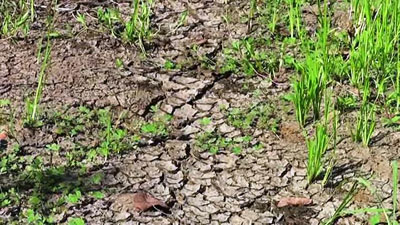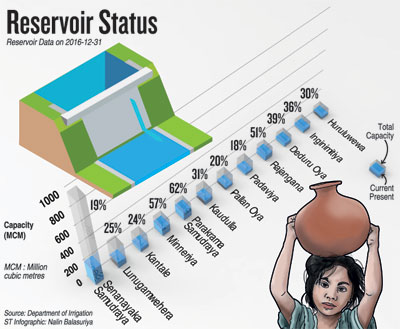News
Farmers direct fury at irrigation officials for worst drought in seven years

Parched land in A'Pura
Farmers are accusing Government officials of being unprepared for the worst drought in seven years, which has roasted thousands of hectares of paddy lands and put drinking water sources in peril.
Many farmers are turning their hand to other activities and some are even looking for other jobs away from their traditional rice-growing areas, farmer groups say. They say officials had not warned farmers of the severe drought conditions, which are expected to continue.
For two successive quarters now agriculture-related activities have shrunk in the country. The price of rice, meanwhile, has risen.
Director of Irrigation S.S.L Weerasinghe told the Sunday Times that water levels in irrigation tanks and canals had shrunk to 33 per cent of normal levels.
He said agriculture officials had been warned of water shortages.
Anuradhapura, Polonnaruwa, Batticaloa, Hambantota, Trincomalee, Vavuniya and Ampara have borne the brunt of the drought.
The District Secretariats of areas baked by the drought said there were plans to provide water to farmlands.
District Secretary of Anuradhapura R.M Wanninayake said the water levels of major irrigation tanks have fallen to 30 per cent of normal levels.
He revealed that only 32,248 hectares of rice had been cultivated out of an estimated one million hectares in the past rice-growing season. He said 48,678 hectares were to have been used for growing vegetables but only 27,900 hectares were cultivated.
Farmers would be provided subsidies and they would be employed to repair tanks, he said.
Wanninayake said he had asked farmers to look for other sources of water for drinking before the drought worsens.
The District Secretary of Batticaloa Ms P.S.M Charles revealed that more than 586,000 people do not have access to drinking water.
Farmers had cultivated only 62,000 hectares, which is 1,000 hectares less than what they would have cultivated.
“This is the worst drought we have experienced since I took office about seven years back,’’ she said. Water supply officials had been asked to provide drinking water to families through tankers. “Next week we plan to meet with the divisional secretaries to discuss ways to face the drought,’’ she said.
Hambantota Divisional Secretary Sumanthi Edirisuriya said families badly affected by the drought had been asked to register, while farmers were urged to conserve water.
Some farmers are not too pleased that the water that remains in tanks are not being released for cultivation.
Anuradhapura farmer Susantha Kumra Nawaratna complained that authorities claim to preserve water for drinking and other uses.
He revealed that Kala Wewa, Nuwara Wewa, Galnewa and Nachadauwa tanks have run dry.
Nawaratna said rice growers are exploring chances to grow other crops to survive
“Even I have decided to find a job as a labourer to support my family. I told my father to manage the crop while I work in town,” he said.
Farmer Jayanath Sandaruwan Rajapaksha, who lives near Hurulu wewa said even the waters of the Mahaweli were not enough to cultivate the Yala and Maha seasons.
“Farmers have been inconvenienced because of the Irrigation Department. They have not even repaired the Hurulu wewa for 28 years,’’ he said adding that five other tanks have been abandoned.
He is also thinking of leaving for Colombo in search of a job.
Farmer Asoka Wimalasuriya also from Anuradhapura said farmers were planning to cultivate other crops.
He said that the Nachchaduwa tank overflowed in May when it rained heavily, then dried up later.
P.B. Sarath, a farmer from Polonnaruwa alleged that there was sufficient water in some tanks but what remained was being used for power generation.
He said Mahaweli project officials were giving priority to electricity generation rather than growing rice.
There was enough water in large reservoirs such as the Parakrama Samudraya, Minneriya and Kawdulla, but officials were preserving the water, he noted. Sarath blames incompetent water management by irrigation and Mahaweli officials for the crisis.
Meanwhile, the All-Island Farmers Federation, national organiser Namal Karunaratne said the Government was ill-prepared for the drought.
He added that due to lack of support from the Government, most farmers have begun to look for other ways to make a living.
The Director General of the Department Agriculture Dr. Rohan Wijekoon told the Sunday Times that 150,000 hectares had been abandoned in the wet zone.
“We plan to encourage farmers to cultivate the lands in the wet zone,’’ he said.
| Power crisis looms in new year Sri Lankans will have to once again prepare for power shortages, especially in the first four months, the energy regulator has warned and the loss-making state-run power utility, the Ceylon Electricity Board, says it will purchase 60 megawatts from private suppliers. CEB General Manager Y M Samarasinghe said tenders have been called. The board will pay Rs 36 per unit. Having warned of a power crisis, the energy regulator, the Public Utilities Commission, recommended full use of all thermal generation plants, tapping energy from generators, and adding new generation plants. The energy regulator recommended that the CEB speed up procurement of 50 mobile generation units after closing the bids on January 4. Amid multi-billion rupee losses, the CEB is facing challenging times in the new year. “We fear that the dry season will continue for six months from the beginning of the new year. Thermal plants are also on standby,’’ Samarasinghe said. Samarasinghe assured mechanics and engineers will be prepared. “We are planing to provide uninterpreted power during the drought,’’ she promised. |

